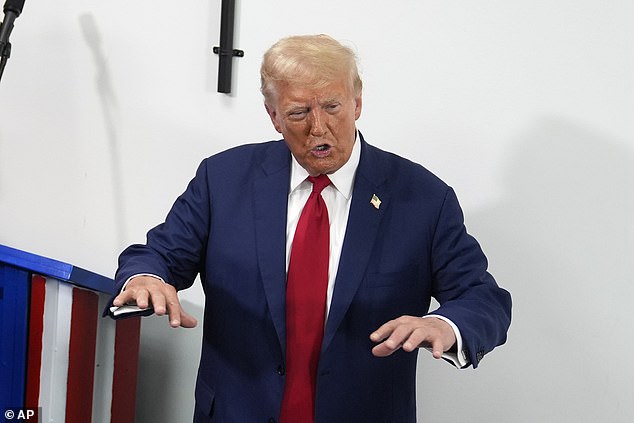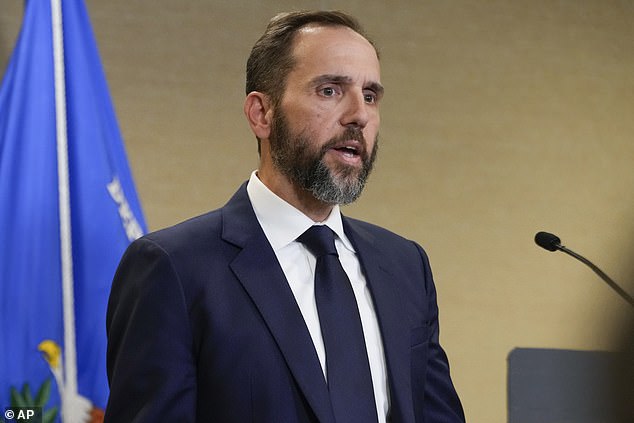Special Counsel Jack Smith Files New Charges Against Donald Trump in Allegation of Interference in the January 6 Election
Special counsel Jack Smith has filed a new, slimmed-down version of his indictment against former President Donald Trump for alleged election interference, in light of the Supreme Court’s immunity decision.
The move comes after the Supreme Court in June granted the former president substantial immunity from prosecution for actions that were “core” of his official duties.
The superseding indictment was returned Tuesday by a new grand jury in Washington, D.C., which had not previously heard evidence in the case.
Prosecutors said the new charges “reflect the government’s efforts to respect and implement the Supreme Court’s rulings and remand instructions.”
It contains the same four core charges against the former president for attempting to undermine the election: conspiracy to defraud the United States; conspiracy to obstruct an official process; obstruction of an official process; and conspiracy to undermine rights.
But it has been reduced to a minimum to comply with the Supreme Court ruling.
Special counsel Jack Smith has obtained a new, slimmed-down version of his indictment against former President Donald Trump
For example, it removes allegations that Trump attempted to use the Justice Department to overturn the election, which the Supreme Court ruling specifically cited as part of his official duties.
The new filing states: ‘The defendant had no official responsibilities with regard to the certification procedure, but as a candidate he did have a personal interest in the election victory.’
Additionally, with several charges under presidential immunity having been removed, the charges against “Conspirator #4” have also been removed from the case.
That person was widely known as former DOJ official Jeffrey Clark. Now there are five unindicted accomplices in the case instead of six with his resignation.
The superseding indictment is 36 pages long, while the original indictment was 45 pages long.
In June, the Supreme Court ruled that there are limitations on charging Jan. 6 rioters with obstruction of peace, a move that also has implications for former President Trump’s case over obstruction of the 2020 federal election.
The 6-3 decision is based on the court’s ideological precepts, which prevents Trump from facing another large-scale trial before the November election. The case will then be sent back to a lower court to determine what constituted his “official” and “unofficial” actions.
“The President has no immunity for his unofficial acts, and not everything the President does is official. The President is not above the law,” the justices, led by Chief Justice John Roberts, wrote in the majority.
“But under our system of separation of powers, the President may not be sued for exercising his core constitutional powers, and he is entitled to at least presumptive immunity from prosecution for his official acts. That immunity applies equally to all occupants of the Oval Office.”
Trump celebrated the decision, writing on Truth Social at the time: “Great victory for our Constitution and democracy. Proud to be an American!”
President Biden said the court had set “a dangerous precedent” with its landmark ruling.
Roberts wrote in his ruling that Trump is also “at least presumptively immune” from the allegations related to the “pressure campaign” on former Vice President Mike Pence regarding the certification of the 2020 election.
Moreover, Trump is “absolutely immune” from alleged misconduct during talks with the Justice Department.

The 6-3 decision dismissed hundreds of lawsuits stemming from the Jan. 6 riots, including the trial of Donald Trump on election fraud charges.

The superseding indictment is 36 pages long, while the original indictment was 45 pages long.
The court ruling makes it harder for the January 6 suspects to be charged with obstructing an official proceeding, which carries a maximum prison sentence of 20 years.
At least 152 people have been convicted of obstructing an official proceeding, according to the Associated Press news agency.
In total, about 350 people have been charged with trying to prevent Congress from certifying Joe Biden’s 2020 election victory.
Judge John Roberts, who wrote the opinion, limited the “obstruction of Congress” charge used by the federal government to prosecute the Jan. 6 defendants.
Roberts called the law, which carries a 20-year prison sentence, “one of the harshest possible sentences.”
A broad interpretation of the law “would also criminalize a wide range of everyday behavior, potentially sending activists and lobbyists to prison for decades,” Roberts said.
The three liberal justices disagreed, expressing concern about the decision’s implications for democracy, saying the Constitution does not protect a former president from being held accountable for criminal and treasonous acts.
Justice Sonia Sotomayor wrote: “It parodies the principle that no one is above the law.”
She added that the decision would make the president “the most powerful person in the country, and possibly the world.”
“Is the Navy Seal Team 6 ordering the assassination of a political rival? Immune. Is it staging a military coup to retain power? Immune. Is it accepting bribes in exchange for a pardon? Immune.”
“Never in the history of our republic has a president had reason to believe that he would be immune from criminal prosecution if he abused the trappings of his office to violate criminal law,” she wrote.
“But looking ahead, all former presidents will be cloaked in such immunity. If the occupant of that office abuses official power for personal gain, the criminal law that the rest of us must abide by will provide no safety net. For fear of our democracy, I disagree,” she concluded.
And Justice Ketanji Brown Jackson added in her dissent: “The President is now a king above the law.”
